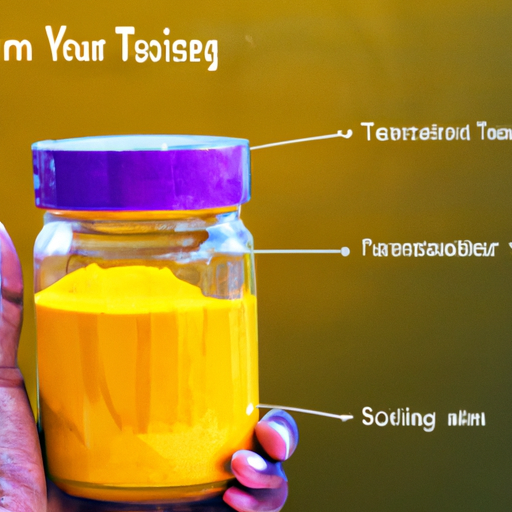As someone who has dealt with inflammation, I am familiar with the discomfort and frustration it can bring. That’s why I decided to try turmeric, a natural remedy that has a long history of being used to help reduce inflammation. Just like many others, I also had the question in mind – how long should I use turmeric for inflammation?
Turmeric is known for its anti-inflammatory properties, and research has shown it may be effective in reducing inflammation in the body. However, the length of time you should take turmeric for inflammation depends on various factors.
In this article, we will explore the potential benefits of turmeric for inflammation, the recommended dosage, and the risks and side effects associated with its use. We’ll also discuss factors that can affect how long you should take turmeric, as well as tips for incorporating it into your diet. By the end of this article, you’ll have a better understanding of how to use turmeric to manage inflammation and improve your overall health.
Key Takeaways
- The duration of turmeric intake for inflammation depends on the severity of inflammation and individual health status.
- Turmeric’s active ingredient curcumin has low bioavailability and is recommended to be consumed with black pepper.
- Studies suggest that turmeric may be effective in reducing inflammation and may have potential benefits for various health conditions.
- It is important to consider the quality and purity of turmeric supplements and individual age and weight, as well as potential risks and side effects, including interactions with prescription drugs and allergic reactions. It is recommended to seek guidance from a healthcare professional, especially for certain populations such as pregnant women.
Understanding Inflammation and Turmeric’s Anti-inflammatory Properties
You might be interested to know that turmeric is believed to have anti-inflammatory properties due to its active ingredient curcumin, which has been studied for its potential to reduce inflammation in the body. However, it’s important to note that the bioavailability of curcumin is low, meaning that our bodies can’t absorb it easily.
To increase its bioavailability, it’s often recommended to consume turmeric with black pepper, which contains a compound called piperine that can enhance the absorption of curcumin. Turmeric’s potential mechanisms of action for its anti-inflammatory effects are still being studied, but it’s thought that curcumin may reduce inflammation by blocking certain enzymes and signaling molecules that contribute to the inflammatory response.
Additionally, curcumin may also have antioxidant properties that can help to reduce inflammation and promote overall health. Understanding these potential mechanisms of action can help to inform the best ways to consume turmeric for maximum benefit.
Moving on to the next section about the potential benefits of turmeric for inflammation, it’s clear that this spice has gained a lot of attention in recent years as a natural remedy for a variety of health conditions.
Potential Benefits of Turmeric for Inflammation
If you’re looking to soothe your body and feel better, turmeric might just be the answer to your prayers. This golden spice has been known to work wonders for those struggling with inflammation, offering a natural and effective remedy that can help ease discomfort and promote healing.
Here are some potential benefits of turmeric for inflammation:
-
Reduces inflammation: Turmeric contains a powerful compound called curcumin, which has been shown to possess anti-inflammatory properties. It works by blocking the activity of certain enzymes that trigger inflammation in the body.
-
Improves joint health: Studies have found that turmeric supplements can help alleviate joint pain and stiffness in people with osteoarthritis. It can also improve mobility and function in those with rheumatoid arthritis.
-
Boosts immunity: Turmeric has been shown to boost the immune system, which can help prevent inflammation and other health issues. It can also improve the body’s ability to fight off infections and diseases.
-
Supports overall health: Turmeric is packed with antioxidants, which can help protect the body from damage caused by free radicals. It can also improve digestion, promote heart health, and even reduce the risk of certain types of cancer.
While turmeric supplements and dietary sources of turmeric can offer many potential benefits for inflammation, it’s important to be aware of the risks and side effects.
Risks and Side Effects of Turmeric
As I’m continuing to research the potential benefits of turmeric, it’s important to also consider the risks and side effects.
There are three key points to consider:
- The potential interactions with medications
- Digestive issues that may arise
- The possibility of allergic reactions
It’s important to be informed about these risks before incorporating turmeric into your diet or supplement regimen.
Interactions with Medications
Be cautious of potential medication interactions when taking turmeric for inflammation, as it may interact with certain prescription drugs. Turmeric can affect the way the liver processes medications, which can lead to higher or lower levels of medication in the bloodstream. For example, turmeric may interact with blood thinners, such as warfarin, and increase the risk of bleeding. It may also interact with antiplatelet drugs, such as aspirin, and increase the risk of bruising and bleeding.
To avoid any potential medication interactions, it is important to talk to your healthcare provider before taking turmeric supplements. They can help you determine the appropriate dosage and monitor any possible side effects. Below is a table outlining some of the medications that may interact with turmeric and the potential effects of those interactions:
| Medication | Potential Interaction | Effect |
|---|---|---|
| Blood thinners | Warfarin, clopidogrel, aspirin, heparin | Increased risk of bleeding and bruising |
| Diabetes medications | Metformin, glimepiride, insulin | Increased risk of low blood sugar levels |
| Acid reducers | Omeprazole, cimetidine, ranitidine | Reduced effectiveness of medication |
| Anti-inflammatory | Ibuprofen, naproxen, celecoxib | Increased risk of stomach bleeding and ulcers |
After discussing with your healthcare provider, you can make an informed decision about whether or not to take turmeric for inflammation. In the next section, we will discuss potential digestive issues that may arise from taking turmeric.
Digestive Issues
To avoid potential digestive discomfort, I recommend being mindful of your turmeric intake. While turmeric is generally safe to consume, some people may experience a burning sensation in their stomach or heartburn when taking supplements. To alleviate these symptoms, you can try taking turmeric with food, reducing your dosage, or switching to a different form of turmeric, such as a capsule or powder.
In addition to these common remedies, dietary changes may also help ease digestive issues. For example, incorporating more fiber-rich foods into your diet, such as fruits, vegetables, and whole grains, can help regulate digestion and prevent discomfort. Drinking plenty of water and avoiding fatty or spicy foods may also be helpful.
By taking these steps, you can continue to enjoy the benefits of turmeric without any unwanted side effects.
Moving forward, it’s important to be aware of potential allergic reactions that may occur when taking turmeric. While rare, some individuals may experience hives, difficulty breathing, or swelling of the face, tongue, or throat. If you experience any of these symptoms, seek medical attention immediately.
Allergic Reactions
If you’re not careful with your turmeric intake, you could experience rare but serious allergic reactions. While turmeric is generally safe for most people, it’s important to know the risks associated with its use. Here are three allergic reaction risks to keep in mind when using turmeric:
-
Contact dermatitis: This occurs when the skin comes into direct contact with turmeric. It can result in redness, itching, and even blisters.
-
Anaphylaxis: This is a rare but serious allergic reaction that can cause difficulty breathing, swelling of the face and throat, and a drop in blood pressure. If you experience these symptoms after consuming turmeric, seek medical attention immediately.
-
Cross-reactivity: If you’re allergic to related plants, such as ginger or cardamom, you may also be allergic to turmeric. Be sure to speak with your doctor if you’re unsure about any allergy risks.
Given these allergic reaction risks, it’s important to take long term use precautions when consuming turmeric. It’s recommended to start with a small dose and gradually increase it over time. Additionally, it’s important to speak with your doctor before using turmeric if you have any underlying medical conditions or if you’re taking any medications that may interact with it.
With the right precautions in place, turmeric can be a safe and effective way to manage inflammation and improve overall health. Now, let’s explore the recommended dosage of turmeric.
Recommended Dosage of Turmeric
Turmeric can provide anti-inflammatory benefits when taken in recommended doses. The recommended amount of turmeric for general health benefits is 500-2,000 mg per day, which can be taken in capsule or powder form. It’s important to note that the active ingredient in turmeric, curcumin, isn’t easily absorbed by the body, so it’s recommended to take turmeric with black pepper or a fat source to enhance absorption.
It’s important to consult with a healthcare provider before starting a turmeric supplement regimen, especially if you’re currently taking any medications or have any underlying health conditions. Factors such as the severity of inflammation, individual health status, and other medications being taken can affect how long someone should take turmeric for inflammation.
Factors That Affect How Long You Should Take Turmeric
Now that we know the recommended dosage of turmeric, we may wonder how long we should take it for inflammation. The duration of turmeric intake can vary depending on several factors. These factors can affect the dosage and the optimal turmeric consumption time.
Firstly, the type and severity of inflammation can influence how long one should take turmeric. Acute inflammation may require shorter periods of consumption compared to chronic inflammation.
Additionally, the individual’s health condition and overall health can also affect the optimal duration of turmeric intake. For example, individuals with digestive issues may need to take turmeric for a longer period to achieve its anti-inflammatory benefits.
Other factors to consider include the quality and purity of the turmeric supplement, as well as the individual’s age and weight.
Now, let’s move on to the next section and explore the studies conducted on turmeric’s effectiveness for inflammation.
Studies on Turmeric’s Effectiveness for Inflammation
Let’s dive into some research on how effective turmeric is in reducing inflammation. Several studies have been conducted to investigate the effectiveness of turmeric in reducing inflammation, with varying results. One study published in the Journal of Alternative and Complementary Medicine found that a dose of 1,000mg of curcumin, the active ingredient in turmeric, taken twice a day for eight weeks, significantly reduced inflammation markers in patients with osteoarthritis.
However, another study published in the Journal of Clinical Psychopharmacology found that a lower dose of curcumin, 500mg taken twice a day for four weeks, did not significantly reduce inflammation markers in patients with major depressive disorder. These conflicting results suggest that the effectiveness of turmeric in reducing inflammation may depend on the dosage and length of use.
Moving on to the next section, let’s explore how to take turmeric to maximize its benefits in reducing inflammation.
How to Take Turmeric
When it comes to taking turmeric, there are a few options to consider. One option is to take turmeric supplements, which can be found in many health food stores.
Another option is to use fresh turmeric in your cooking, which can add flavor and health benefits to your meals. Personally, I prefer using fresh turmeric in my cooking as it allows me to control the amount and enjoy the taste, but taking supplements can be a convenient alternative for those who don’t cook with turmeric regularly.
Supplements vs. Fresh Turmeric
Turmeric supplements are convenient, but have you considered using fresh turmeric for its anti-inflammatory benefits? While supplements may be easier to find and take, fresh turmeric contains higher levels of curcumin, the active compound responsible for its anti-inflammatory effects.
Additionally, fresh turmeric has more bioavailability, meaning that our bodies can absorb and utilize it more effectively compared to supplements.
Supplements vs. fresh turmeric is not the only consideration when it comes to incorporating this spice into your diet. Cooking with turmeric is another great way to enjoy its health benefits.
From adding it to soups and stews to using it in marinades and dressings, there are many ways to incorporate fresh turmeric into your daily meals. By doing so, you can not only enjoy its anti-inflammatory properties but also add a delicious and unique flavor to your dishes.
Cooking with Turmeric
You can easily incorporate the vibrant and flavorful spice of turmeric into your daily meals by adding it to your favorite soups, stews, marinades, and dressings. Turmeric recipes offer a variety of delicious options to choose from, such as golden milk, turmeric roasted carrots, and turmeric quinoa bowls.
Not only does turmeric add a burst of color and flavor to your meals, but it also has numerous health benefits. Firstly, turmeric has anti-inflammatory properties that can help reduce inflammation in the body, which is linked to a variety of chronic diseases. Secondly, turmeric contains curcumin, which has antioxidant properties that can help protect against cellular damage. Lastly, turmeric has been shown to have potential benefits for brain health and may improve cognitive function.
Incorporating turmeric into your diet is a simple and delicious way to boost your health and add some spice to your meals. When it comes to tips for incorporating turmeric into your diet, there are many options to choose from. From adding it to your morning smoothie to sprinkling it on top of your roasted vegetables, the possibilities are endless.
Tips for Incorporating Turmeric into Your Diet
Adding a dash of this golden spice to your dishes can spice up your meals and potentially provide anti-inflammatory benefits. Turmeric is a versatile ingredient that can be used in various ways to incorporate into your daily diet. Here are some tips for incorporating turmeric into your meals:
| Turmeric Tea | Turmeric Smoothies | Turmeric Rice Bowl |
|---|---|---|
| Boil water and add turmeric powder, ginger and honey. Let steep for a few minutes before drinking. | Blend turmeric powder, coconut milk, banana, pineapple and ginger for a healthy smoothie | Add turmeric powder to cooked rice and mix with vegetables, beans, and a protein source for a balanced meal. |
Turmeric tea and smoothies are great options for those who are looking for a quick and easy way to incorporate turmeric into their diet. These beverages can be consumed daily and can provide a boost of antioxidants and anti-inflammatory properties. Another way to incorporate turmeric is by adding it to a rice bowl, which makes a complete and satisfying meal.
Incorporating turmeric into your diet is just one natural remedy for inflammation. However, there are other natural remedies that can also be beneficial.
Other Natural Remedies for Inflammation
There are a plethora of natural remedies that can help combat inflammation and improve overall health. Along with incorporating turmeric into your diet, there are several other options to consider. Here are some herbal supplements, dietary changes, and lifestyle modifications that may be beneficial:
- Omega-3 fatty acids: Found in foods such as fatty fish, nuts, and seeds, omega-3s have anti-inflammatory properties and may help reduce inflammation in the body.
- Ginger: Like turmeric, ginger contains compounds that have anti-inflammatory effects. It can be added to meals, brewed into tea, or taken in supplement form.
- Probiotics: These beneficial bacteria can improve gut health, which in turn may help reduce inflammation throughout the body.
- Meditation: Stress can contribute to inflammation, and meditation has been shown to help reduce stress levels. Consider incorporating a daily meditation practice into your routine.
- Exercise: Regular physical activity can also help reduce inflammation. Aim for at least 30 minutes of moderate exercise most days of the week.
By incorporating these natural remedies into your routine, you may be able to further reduce inflammation and improve your overall health. However, it’s important to consult with a healthcare professional before trying turmeric or any new supplement or lifestyle modification.
Consult with a Healthcare Professional before Trying Turmeric
It’s crucial to seek guidance from a healthcare professional before incorporating any new supplement or lifestyle change, especially when it comes to turmeric consumption.
While turmeric has shown promise in reducing inflammation, its effectiveness can vary based on a person’s individual health and medical history. Additionally, it’s important to consider the dosage and potential side effects of turmeric, as too much of it can lead to gastrointestinal issues.
It’s also important to note that turmeric should be approached with caution for certain populations, such as pregnant women. While turmeric has been used in traditional medicine to treat various ailments, there is limited research on its safety during pregnancy. Therefore, it’s best to consult with a healthcare professional before consuming turmeric if you’re pregnant or planning to become pregnant.
By seeking guidance from a healthcare professional, you can ensure that you’re incorporating turmeric into your diet in a safe and effective manner.
Frequently Asked Questions
Can turmeric be harmful if taken in large doses or for extended periods of time?
Yes, turmeric dosage should be monitored, as prolonged high intake may cause side effects such as stomach upset, dizziness, and liver damage. Consult with a healthcare provider for appropriate turmeric use.
Are there any specific medical conditions or medications that may interact negatively with turmeric?
Drug interactions are possible with turmeric, particularly for those with pre-existing conditions such as bleeding disorders, gallbladder issues, or diabetes. It’s important to consult with a healthcare provider before taking turmeric regularly.
Can turmeric be applied topically for inflammation or is it only effective when consumed orally?
Topical turmeric benefits include reducing inflammation and improving skin health. It is effective when applied directly to the affected area. Compared to other topical anti-inflammatories, turmeric may be a safer and more natural option.
How long does it take for turmeric to start showing anti-inflammatory effects in the body?
Wow, turmeric is a game changer for inflammation! With the right dosage, I noticed a significant reduction in pain and swelling within a few weeks. But the long term effects are even more impressive, as turmeric helps prevent inflammation from occurring in the first place.
Are there any specific forms of turmeric (such as capsules, powder, or fresh root) that are more effective for treating inflammation?
Capsules and powder forms of turmeric are both effective in treating inflammation. However, capsules may be more convenient for consistent dosing. Turmeric recipes can also be incorporated into one’s diet for added benefits.
Conclusion
In conclusion, turmeric can be a powerful natural remedy for inflammation, but it’s important to understand the risks and potential side effects before incorporating it into your daily routine.
With its anti-inflammatory properties, turmeric has the potential to improve symptoms of various inflammatory conditions, such as arthritis and digestive issues. However, it’s crucial to take the recommended dosage and consult with a healthcare professional before using it.
Factors such as the severity of your inflammation and how your body responds to turmeric can also affect how long you should take it. Remember to start with a small amount and gradually increase your intake to avoid any adverse effects.
With proper care and attention, turmeric can be a valuable addition to your wellness routine, helping to reduce inflammation and promote overall health. So, sprinkle some turmeric in your meals and reap the benefits of this golden spice!










